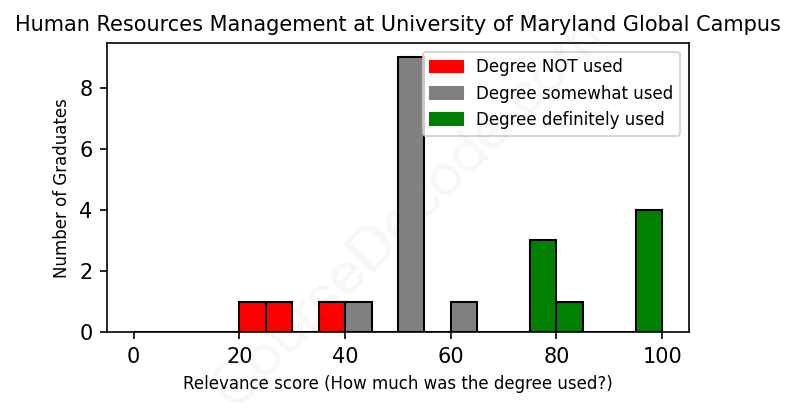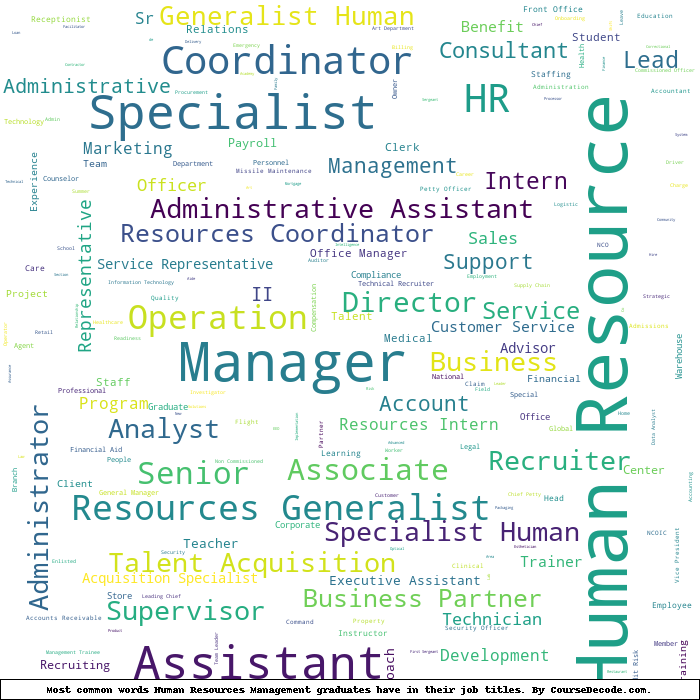
First, some facts. Of the Human Resources Management graduates from University of Maryland Global Campus we've analyzed , here's how many have used (or NOT used) their degree in their career:

These are estimates based on AI analysis of 22 LinkedIn profiles (see below).
The verdict? Below average. Overall, with an average relevance score of 61%, Human Resources Management graduates from University of Maryland Global Campus have a lower likelihood (-6%) of finding work in this field compared to the average graduate across all fields:
And for comparison, here's the chart for all profiles we've looked at across all degrees.
Also, after graduating, 40% of these graduates have pursued further education other than another Bachelor's degree (such as a Masters degree or other), compared to the average across all profiles of 35%. This suggests you may need more than just a Bachelors degree to be competitive as a Human Resources Management graduate.
See the details:
|
Relevance score: 100% We think this person has gone into a career highly relevant to their degree. We think this person has gone into a career highly relevant to their degree.
DEGREE INFOGraduated in 2020 from University of Maryland Global Campus with a Bachelor's degree in Human Resources Management. No other secondary education since. JOB HISTORY SINCE GRADUATIONModel EEO / Worklife Manager United States Marine Corps Oct 2020 - Present ABOUTNo information provided. |
The top 10 most common jobs done by the graduates we've analyzed (ranked most common to least) are:
Looking at the job histories of people who graduated with a degree in Human Resources Management from the University of Maryland Global Campus, the most common roles they’ve taken tend to be in various capacities within human resources, like HR Assistant, HR Specialist, or even HR Manager. There are also a fair number of individuals in the military, occupying positions that involve HR functions like NCOIC at Brigade Human Resources Offices. Some of these roles are clearly aligned with HR management principles, focusing on recruitment, employee relations, and training. For instance, positions like Senior Human Resources Assistant or Talent Acquisition Partner are great examples of how graduates have leveraged their education directly into HR roles.
However, not every position listed is heavily HR-centric. You’ll find a number of jobs that don’t require specific HR skills at all—like Substitute Teacher, Sales Consultant, or even roles focused more on operational duties rather than HR principles. While some of these roles might use basic interpersonal skills that could relate to HR, they don't make full use of the in-depth knowledge and competencies that come with a degree in Human Resources Management. Overall, it seems like many alumni are finding jobs in HR-related fields, but a notable number end up in roles that are either tangentially relevant or completely unrelated to human resources management.
Here is a visual representation of the most common words in job titles for Human Resources Management graduates (this is across all Human Resources Management graduates we've analyzed, not just those who went to University of Maryland Global Campus):

Looking at the career paths of graduates from the University of Maryland Global Campus with a degree in Human Resources Management, it's clear that many have found their way into relevant positions in HR or related fields soon after graduation. For those who finished their degrees around 2010 to 2020, a lot started with roles like HR assistants, coordinators, or even managerial positions in various companies, including big names like Amazon and the US Army. These initial jobs often serve as stepping stones, allowing them to build valuable experience in handling employee relations, recruitment, and HR operations. It appears that graduates are landing jobs that align pretty well with their degree right out of the gate, which is promising.
Fast forward five to ten years, and many of these individuals have climbed the ranks into more significant roles. Some have advanced to positions like HR managers, specialists, and even directors. Others have remained in government or military roles, showcasing the stability and growth opportunities within those sectors as well. However, not everyone has had a straightforward or successful trajectory. A few graduates have drifted into unrelated fields, taking on roles like substitute teaching or sales, which might suggest that the path isn't always linear after graduation. Yet, on the whole, it looks like a solid percentage of these graduates have managed to stay connected to HR and related areas, indicating that a degree in Human Resources Management from this university can indeed lead to meaningful and rewarding career opportunities.
Honestly, a Bachelor’s degree in Human Resources Management, whether at the University of Maryland Global Campus or elsewhere, is typically considered to be on the easier side compared to some other degrees. It’s not like you’re diving deep into advanced math or physics! The coursework usually focuses on topics like communication, employee relations, and labor laws, which are more about understanding concepts and applying them rather than crunching numbers. Plus, since UMGC is designed for working adults, the online format can be quite flexible, allowing you to balance studies with life. So, if you're organized and motivated, it should be a manageable experience!
Most commonly, in the LinkedIn profiles we've looked at, it takes people 2 years to finish a Bachelor degree in Human Resources Management.
Looking at these University of Maryland Global Campus grads, it seems like a mixed bag when it comes to how much money they're making. The ones who landed jobs with the US Army and various government departments likely have solid salaries, especially as they move up in ranks, while others at places like Amazon and Lowe's probably earned decent pay, but maybe not enough to be swimming in cash. Some of the newer grads, like those just starting out in HR or community management roles, are likely making entry-level salaries, which is totally normal for their stage in their careers. Overall, it looks like they’re mostly on a good path, but it really depends on the job and level they’re at—some are definitely doing pretty well, while others may just be getting their feet wet.
Here is a visual representation of the most common words seen in the "about" section of LinkedIn profiles who have a Bachelor degree in Human Resources Management (this is across all Human Resources Management graduates we've analyzed, not just those who went to University of Maryland Global Campus). This may or may not be useful:

Here are all colleges offering a Bachelor degree in Human Resources Management (ordered by the average relevance score of their Human Resources Management graduates, best to worst) where we have analyzed at least 10 of their graduates:
| College | Score | Count |
|---|---|---|
 San Jose State University San Jose State University
|
83 | 14 |
 Western Governors University Western Governors University
|
71 | 50 |
 Saint Leo University Saint Leo University
|
71 | 12 |
 Davenport University Davenport University
|
71 | 11 |
 Capella University Capella University
|
70 | 15 |
 Rutgers University Rutgers University
|
67 | 14 |
 Southern New Hampshire University Southern New Hampshire University
|
66 | 30 |
 Lindenwood University Lindenwood University
|
64 | 11 |
 DeVry University DeVry University
|
63 | 31 |
 University of Maryland Global Campus University of Maryland Global Campus
|
61 | 22 |
 Upper Iowa University Upper Iowa University
|
61 | 12 |
 Columbia Southern University Columbia Southern University
|
59 | 28 |
 Central Michigan University Central Michigan University
|
57 | 15 |
 Colorado Technical University Colorado Technical University
|
57 | 16 |
 American InterContinental University American InterContinental University
|
56 | 24 |
 University of Phoenix University of Phoenix
|
55 | 90 |
 Ashford University Ashford University
|
52 | 36 |
 American Military University American Military University
|
52 | 13 |
 Park University Park University
|
52 | 21 |
 University of Maryland University College University of Maryland University College
|
51 | 15 |
 Strayer University Strayer University
|
47 | 31 |